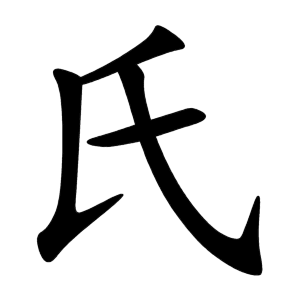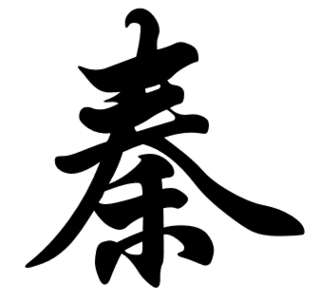See also
- Ji Li (disambiguation)
- Li Chi (disambiguation), the Wade–Giles romanization of Li Ji
- Li Jie (disambiguation)
Li Ji may refer to:

Emperor Jing of Han was the sixth emperor of the Chinese Han dynasty from 157 to 141 BC. His reign saw the limiting of the power of the feudal kings/princes which resulted in the Rebellion of the Seven States in 154 BC. Emperor Jing managed to crush the revolt and princes were thereafter denied rights to appoint ministers for their fiefs. This move helped to consolidate central power which paved the way for the long reign of his son Emperor Wu of Han.
Qi, meaning air, in traditional Chinese culture, is an active principle forming part of any living thing.

The Chinese clan surname Chinese: 氏; pinyin: Shi is a branch of the ancient Chinese ancestral surname. As the descendants of the same ancestor multiplied, the family would often split into several branches scattered in various places. The descendants of each branch, in addition to retaining the ancestral surname, take a clan name. In other words, the ancestral surname is the common name for all descendants of a family, while the clan name is a branch derived from the ancestral surname.

Han is a common Chinese surname. The spelling "Han" is based on China's pinyin system and so used throughout Mainland China. Spelling can vary from 'Hon' in Cantonese-speaking areas to 'Hang' in Hainan. It is the 15th name on the Hundred Family Surnames poem. In 2003, Han (韩) is ranked 25th in China in terms of the number of bearers at around 8 million persons. In 2019 it was the 28th most common surname in Mainland China.
Xi'an or Xian (西安) is the capital of Shaanxi province, China.

Zhōu is the Hanyu Pinyin transliteration of the Chinese surname 周, which ranks as the 10th most common surname in Mainland China as of 2019. In 2013 it was found to be the 10th most common name, shared by 25,200,000 people or 1.900% of the population, with the province with the most being Hunan. Derived from the Zhou dynasty, it has been one of the ten most common surnames in China since the Yuan dynasty. It is the 5th name on the Hundred Family Surnames poem.

Qín (秦) is a common Chinese surname. "Qin" is the hanyu pinyin romanization of the surname for Mandarin, the common dialect of China; other romanizations of the surname include Chin and Jin in Mandarin, Ceon and Cheun in Cantonese, and Tần in Vietnamese. People with this surname are most commonly found in Henan, Shaanxi, Shandong, Sichuan, Hubei and Hebei. It is the 18th name on the Hundred Family Surnames poem.
Consort Ji may refer to:

Pān is the Mandarin pinyin romanization of the East Asian surname 潘. It is listed 43rd in the Song dynasty classic text Hundred Family Surnames. It is romanized as P'an in Wade–Giles; Poon, Phoon, Pon, or Pun in Cantonese; Phua in Hokkien and Teochew.

Lü is the pinyin and Wade–Giles romanisation of the Chinese surname written 吕 in simplified character and 呂 in traditional character. It is the 47th most common surname in China, shared by 5.6 million people, or 0.47% of the Chinese population as of 2002. It is especially common in Shandong and Henan provinces.
Consort Chen may refer to:
Consort Li may refer to:
Ban is the Mandarin pinyin romanization of the Chinese surname written 班 in Chinese character. It is romanized Pan in Wade–Giles. Ban is listed 235th in the Song dynasty classic text Hundred Family Surnames. It is not among the 300 most common surnames in China. In 2013 it was the 269th most common surname shared by 273,000 people, comprising 0.021% of the total population and the provincial level unit with the most people having the name being Guangxi.

Tián, or T'ien in Wade-Giles is a Chinese surname. An alternative transliteration of "田" from Cantonese is Tin, from Hokkien is Thinn. It appeared in the Hundred Family Surnames text from the early Song Dynasty. It also means "field". In 2019 it was the 34th most common surname in Mainland China.
傅 is an ancient Han Chinese surname of imperial origin which is at least 4,000 years old. The great-great-great-grandson of the Yellow Emperor, Dayou, bestowed this surname to his son Fu Yi and his descendants. Dayou is the eldest son of Danzhu and grandson of Emperor Yao.

Lu is the pinyin and Wade–Giles romanization of the Chinese surname written 陆 in simplified character and 陸 in traditional character. It is also spelled Luk or Loke according to the Cantonese pronunciation. Lu 陆 is the 61st most common surname in China, shared by 4.2 million people. Most people with the surname live in southern China; 44% live in just two provinces: Jiangsu and Guangxi. Lu 陸 is listed 198th in the Song dynasty classic text Hundred Family Surnames.

Jì is the Mandarin pinyin romanization of the Chinese surname written 季 in Chinese character. It is romanized as Chi in Wade–Giles, and Gwai in Cantonese. Ji is the 142nd most common surname in China, with a population of 960,000. It is listed the 134th in the Song dynasty classic text Hundred Family Surnames.
Gan is a surname. It may be a Latin-alphabet spelling of four different Chinese surnames, a Korean surname, and a surname in other cultures.
Lady Li may refer to any woman in imperial China with the surname Li, such as:
Consort Qi may refer to: